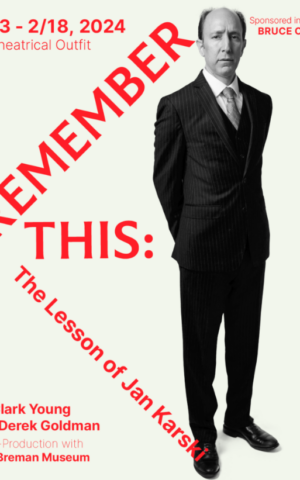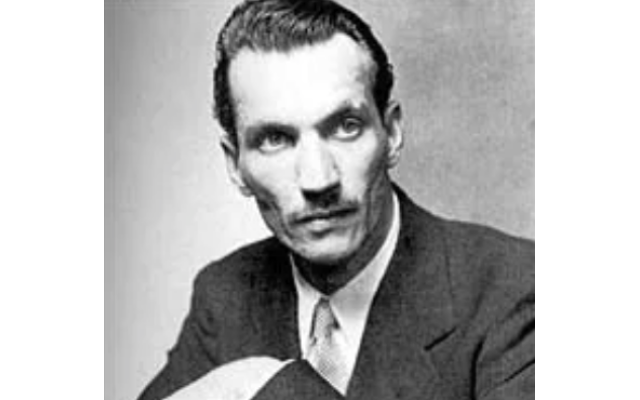Theatrical Outfit Details Karski’s Moral Heroism
The play centers around Karski’s efforts to persuade the American government to intervene in the Holocaust during World War II.
“Remember This,” performed at Theatrical Outfit in downtown Atlanta and presented with The Breman Museum, is a story set during World War II of the attempt to alert the world to the destruction of the Jews in Germany by the Nazis and their allies.
The one-man show, which is also titled, “The Lesson of Jan Karski,” is a performance of a lifetime by Andrew Benator, whose family has their roots in Atlanta’s Sephardic community. Working on a bare stage with only a wooden table and two wooden chairs as props, he simulates the abuse and torment that Karski, who was Catholic, and active in the Polish resistance, suffered at the hands of the Nazis.
With his sharp mind and an almost photographic memory, he became a trusted courier between various factions active in the underground. Eventually, with his skill in languages he is chosen to alert the world to what he had seen as a personal witness to the brutality of the Nazi occupation.

He also secretly tours the Warsaw ghetto, and he visits a Nazi concentration camp where Jews are stuffed into cattle cars bound for Auschwitz.
But his most intense anguish came in 1943 at the hands of those whom he attempts to alert in the American and British government.
He travelled to London to speak with the British wartime Foreign Secretary, Anthony Eden, and then to Washington for a half-hour meeting with President Franklin Roosevelt. Both of them ignore his dramatic pleas. Roosevelt particularly shows more concern for the horses of Poland than its Jews. After meeting the president, he sought out the Supreme Court Justice Felix Frankfurter, who was Jewish. However, Frankfurter curtly dismisses him, with the words, “I don’t believe you.”
Many of the most dramatic moments in the play come when Karski reacts to the responses of these world leaders to the atrocities of the Holocaust that he has personally witnessed.
Although he is portrayed as deeply indignant and discouraged by his meeting with the American leader, it is said that after his meeting with Karski, the president was moved to establish the War Relief Board, the beginning of official American government efforts to aid the victims of Nazi tyranny.
The stage performance is a follow up to the filmed version of the work, which was shown at last year’s Atlanta Jewish Film Festival. Like the film, it was directed by Derek Goldman who also co-authored the play. Goldman is a professor of theater and the artistic and executive director of Georgetown University’s theater lab. On a side note, Georgetown is where Karski taught starting in the 1950s.
When the AJT spoke with Goldman last year, he was finishing up a theatrical tour of Poland, with the star of the film and the play, David Strathairn, the distinguished American actor. He is perhaps best known for his portrayal of Edward R. Murrow, the legendary American journalist and broadcaster, in the film, “Good Night and Good Luck,” for which he was nominated for an Academy Award.
Goldman believes that his play dramatizes the choices that confront us in life and how we respond to them.

“I think for us, one of the core themes of the film is individual responsibility, the idea that individuals have souls. Karski didn’t go silent; he chose to teach for 40 years. And we see in his teachings and his beliefs our human tendency to ignore things that are not convenient, as the film says, and our tendency towards certain kinds of denial and complacency that individuals have. He believes that souls and individuals have the capacity to make significant differences by taking care of each other, by bearing witness to what’s happening, by speaking up and speaking out.”
Frustrated by his journey to the United States, Karski turned to tell his story to the American public. In 1944, he wrote, “Story of a Secret State: My Report To The World,” about his experiences in Poland. It sold 400,000 copies, became a best seller and a Book of the Month Club selection.
In 1952, he began teaching at Georgetown University where he received a PhD, and he spent the next 32 years of his life teaching the lessons he had learned of man’s inhumanity to his fellow man.
He was cited by Yad Vashem, as a “Righteous Gentile” and made an honorary citizen of Israel for his work during the Holocaust; and, in 2012, he was posthumously awarded the Presidential Medal of Freedom by President Barack Obama. It is the highest civilian award the American government can bestow.
- Arts and Culture
- Opinion
- Bob Bahr
- Remember This
- Theatrical Outfit
- Breman Museum
- The Lesson of Jan Karski
- Andrew Benator
- Anthony Eden
- Franklin Roosevelt
- Supreme Court Justice Felix Frankfurter
- War Relief Board
- Atlanta Jewish Film Festival
- Derek Goldman
- Georgetown University
- David Strathairn
- Edward R. Murrow
- Yad Vashem
- Barack Obama




comments